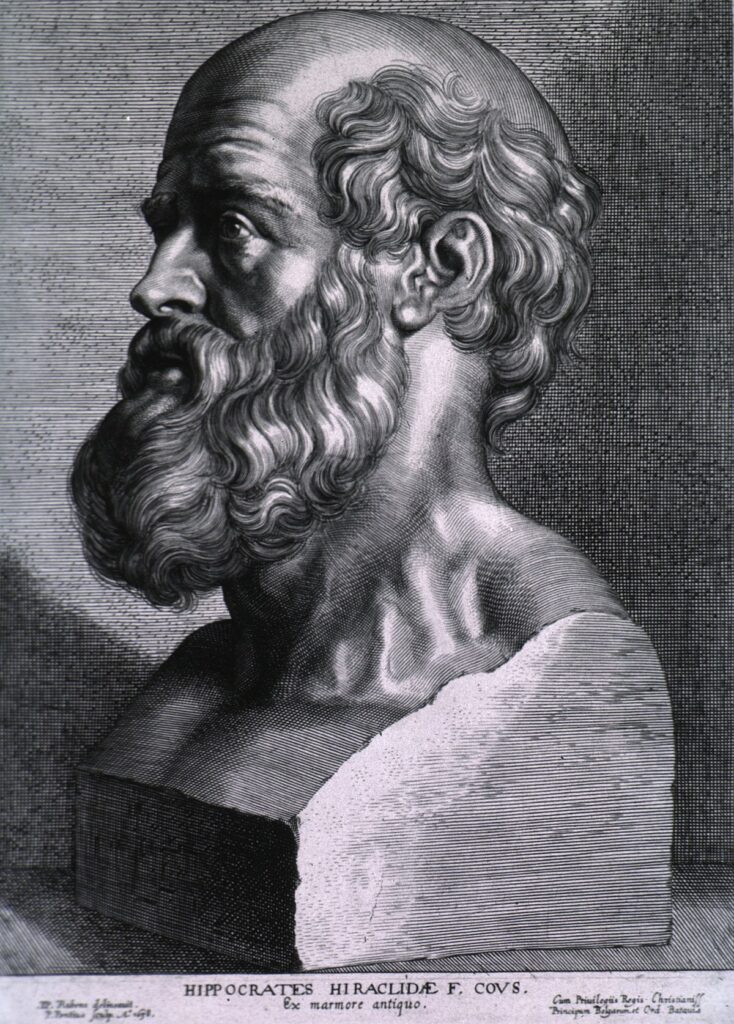Hippocrates, the ancient Greek physician often hailed as the “Father of Medicine,” laid the groundwork for modern medical ethics and practice. His emphasis on observation, clinical diagnosis, and the natural healing power of the body remains influential. However, in the realm of complementary and alternative medicine (CAM), Hippocrates’ name and legacy are often invoked in ways that distort his original teachings or exploit his historical significance for credibility. This article explores how certain CAM theories and practices misuse Hippocrates’ name, often without any real relevance to his actual contributions.
1. Humoral theory and modern naturopathy
Hippocrates is closely associated with the ancient humoral theory, which posits that health is determined by the balance of four bodily fluids or “humors”: blood, phlegm, yellow bile, and black bile. This theory, while groundbreaking for its time, has been largely discredited by modern science. However, some modern naturopathic practices claim to follow “Hippocratic principles” by focusing on balancing bodily systems.
The Misuse:
Naturopaths often reinterpret the humoral theory to fit contemporary ideas about detoxification, cleansing, or balancing “energies.” For example, treatments like bloodletting, colon cleanses, or liver detoxes are sometimes justified by referencing Hippocrates. While these practices may sound ancient and authoritative, they often lack scientific evidence and misrepresent the historical context of humoral theory. Hippocrates himself would likely have rejected such oversimplified and unproven approaches.
2. Dietary and lifestyle approaches
Hippocrates famously said, “Let food be thy medicine and medicine be thy food,” emphasizing the importance of diet and lifestyle in maintaining health. This principle has been embraced by many CAM practitioners, particularly those promoting detox diets, alkaline diets, or other dietary regimens.
The Misuse:
While Hippocrates did advocate for a holistic approach to health, modern dietary theories often take his words out of context. For example, the alkaline diet claims that eating certain foods can alter the body’s pH balance, preventing disease. However, this idea has no scientific basis and misrepresents Hippocrates’ emphasis on moderation and individualized care. Similarly, detox diets often invoke his name to promote unproven and potentially harmful practices, such as extreme fasting or the use of laxatives.
3. Herbal medicine and “nature cure”
Hippocrates used plant-based remedies as part of his medical practice, and his work is sometimes cited as evidence for the efficacy of herbal medicine. Modern herbalists and “nature cure” advocates often claim to follow in his footsteps, promoting the use of natural substances for healing.
The Misuse:
While Hippocrates did use herbs, his approach was based on careful observation and tailored to individual patients. In contrast, many modern herbal remedies are marketed with broad, unsubstantiated claims about their effectiveness. For example, herbal supplements like echinacea or ginseng are often promoted as cure-alls, despite limited scientific evidence. By invoking Hippocrates’ name, these practices gain an air of historical legitimacy, even though they lack the rigor and specificity of his original methods.
4. Holistic and vitalistic approaches
Hippocrates is often celebrated for his holistic approach to medicine, which considers the whole person—body, mind, and environment—rather than focusing solely on symptoms. This philosophy has been adopted by many CAM practitioners, particularly those promoting energy medicine or vitalism.
The Misuse:
Some CAM theories, such as reiki, acupuncture, or homeopathy, claim inspiration from Hippocrates’ holistic principles. However, these practices often incorporate concepts like “energy fields,” “qi,” or “vital forces” that have no basis in Hippocratic medicine or ancient Greek philosophy. By associating themselves with Hippocrates, these theories attempt to borrow credibility from his legacy, even though their underlying principles are fundamentally different.
5. The Hippocratic Oath in alternative medicine
The Hippocratic Oath, a cornerstone of medical ethics, is sometimes referenced by CAM practitioners to emphasize their commitment to ethical practice. While the oath is historically significant, its modern use in CAM contexts can be misleading.
The Misuse:
The Hippocratic Oath emphasizes principles like beneficence, non-maleficence, and patient confidentiality. However, some CAM practitioners use the oath to imply that their methods are equally valid or ethical as conventional medicine, even when those methods lack scientific support. For example, a homeopath or energy healer might invoke the oath to justify their practice, despite the absence of evidence for their treatments. This misuse of the oath undermines its true purpose and misleads patients about the nature of the therapies being offered.
Why does this matter?
The misuse of Hippocrates’ name in CAM is not just a historical curiosity—it has real-world implications. By invoking the authority of a revered figure like Hippocrates, CAM practitioners can lend an air of legitimacy to unproven or pseudoscientific treatments. This can lead to:
- Misinformation: Patients may be misled into believing that certain therapies are supported by ancient wisdom or historical evidence, when in fact they are not.
- Harm: Unproven treatments can delay or replace effective medical care, potentially causing harm to patients.
- Erosion of Trust: The misuse of Hippocrates’ legacy can undermine trust in both historical medical traditions and modern evidence-based medicine.
Conclusion: Separating myth from reality
Hippocrates’ contributions to medicine are undeniable, but his legacy should not be exploited to promote unproven or pseudoscientific practices. While some CAM theories may draw inspiration from his holistic approach or emphasis on natural healing, they often distort his teachings to fit modern agendas. As patients and consumers, it is important to critically evaluate claims that invoke Hippocrates’ name and to seek out evidence-based care. By doing so, we can honor the true spirit of Hippocratic medicine—grounded in observation, reason, and a commitment to the well-being of patients.

